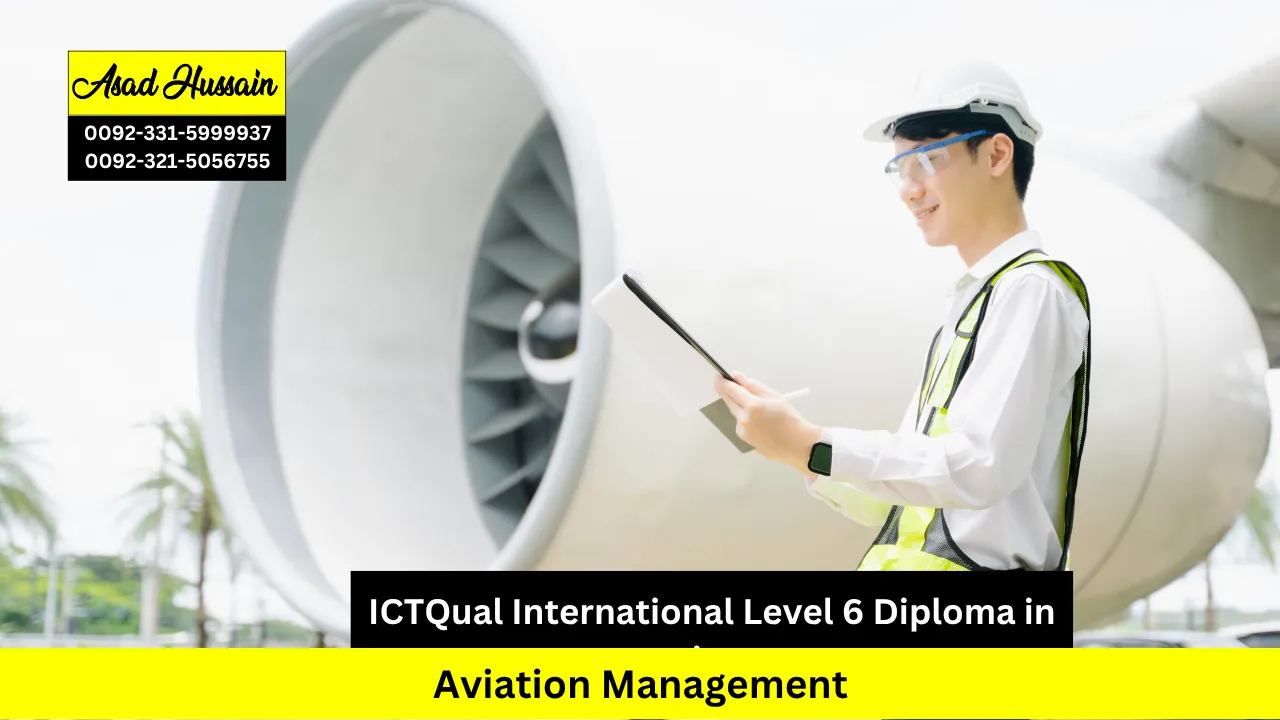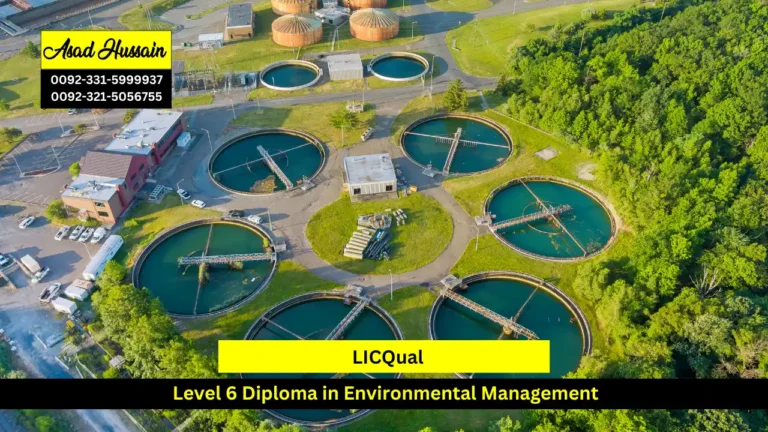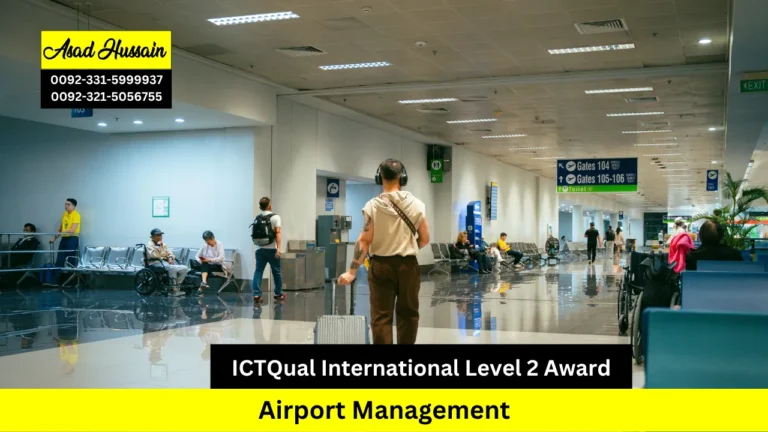The ICTQual International Level 6 Diploma in Aviation Management is a prestigious, globally recognized qualification designed for learners and professionals aiming to reach senior leadership and strategic management positions in the aviation industry. Building on the knowledge gained at Level 5, this advanced program provides in‑depth expertise in aviation strategy, global operations, safety and security management, regulatory compliance, and organizational leadership.
As the aviation sector continues to evolve and expand worldwide, the demand for highly skilled leaders who can manage complex operations and drive innovation is greater than ever. This diploma equips learners with the advanced competencies required to oversee large‑scale aviation projects, manage international teams, and make strategic decisions that shape the future of airlines, airports, and aviation organizations.
The course is ideal for experienced aviation professionals, graduates of Level 5 qualifications, and international learners seeking a qualification that is respected across the globe. With its strong academic framework and practical industry relevance, the ICTQual Level 6 Diploma in Aviation Management not only enhances employability but also provides a direct pathway to postgraduate studies, including master’s degrees in aviation, business, or management.
By completing this program, learners gain the confidence to lead effectively. They develop advanced skills in aviation strategy, safety, and operations. The diploma provides global recognition, opening doors to international careers. Graduates are prepared to thrive as leaders in a fast‑growing aviation industry.
Program Highlights
Mandatory Units
This qualification, the ICTQual International Level 6 Diploma in Aviation Management, consists of 6 mandatory units.
- Global Aviation Strategy and Policy Development
- Airline Corporate Governance and Strategic Leadership
- Advanced Airport Operations and International Logistics
- Aviation Economics, Finance, and Risk Analysis
- Innovation, Technology, and Digital Transformation in Aviation
- Research Methods and Applied Aviation Project
To enroll in the ICTQual International Level 6 Diploma in Aviation Management, applicants are expected to meet the following criteria:
- Age Requirement: Learners should generally be 19 years or older at the time of enrollment.
- Educational Background: A Level 5 qualification in Aviation Management, Business, or a related field (such as the ICTQual Level 5 Diploma in Aviation Management or equivalent) is required.
- Work Experience (Preferred): Relevant professional experience in aviation, airport operations, airline management, or customer service is highly valued and may strengthen an application.
- English Language Proficiency: Since the program is delivered in English, learners should demonstrate strong written and spoken English skills, either through previous education or an equivalent qualification.
- Academic Progression: Applicants should show readiness for advanced study, with the ability to analyze, evaluate, and apply strategic management concepts in aviation.
- Motivation and Commitment: Candidates must demonstrate a genuine interest in aviation leadership and the ability to complete both theoretical and practical aspects of the program.
Learning Outcomes for the ICTQual International Level 6 Diploma in Aviation Management:
Global Aviation Strategy and Policy Development
By the end of this unit, learners will be able to:
- Analyse the strategic role of aviation in global trade, tourism, and connectivity.
- Evaluate the influence of international organisations and regulatory bodies on aviation policy.
- Demonstrate understanding of bilateral and multilateral agreements shaping global aviation.
- Assess the impact of political, economic, and environmental factors on aviation strategy.
- Apply strategic frameworks to real‑world aviation policy challenges.
- Recognise the importance of sustainability and innovation in long‑term aviation strategies.
- Develop policy recommendations aligned with global aviation trends.
Airline Corporate Governance and Strategic Leadership
By the end of this unit, learners will be able to:
- Explain the principles of corporate governance in aviation organisations.
- Analyse the role of boards, executives, and stakeholders in airline governance.
- Evaluate ethical and regulatory responsibilities in corporate decision‑making.
- Demonstrate understanding of strategic leadership theories and their application in aviation.
- Assess the impact of leadership styles on organisational culture and performance.
- Apply governance and leadership principles to airline management scenarios.
- Develop strategies for effective stakeholder engagement and accountability.
Advanced Airport Operations and International Logistics
By the end of this unit, learners will be able to:
- Explain the complexities of modern airport operations and logistics systems.
- Analyse the integration of passenger, cargo, and ground handling services.
- Evaluate the role of international logistics in supporting global aviation networks.
- Demonstrate understanding of airport capacity planning and infrastructure management.
- Assess the impact of disruptions on airport and logistics operations.
- Apply operational strategies to improve efficiency and service delivery.
- Recognise the importance of technology in enhancing airport and logistics performance.
Aviation Economics, Finance, and Risk Analysis
By the end of this unit, learners will be able to:
- Explain the principles of aviation economics and financial management.
- Analyse airline and airport cost structures, revenue streams, and profitability.
- Demonstrate understanding of financial planning, forecasting, and investment strategies.
- Evaluate the role of risk analysis in aviation financial decision‑making.
- Apply financial tools to assess organisational performance and sustainability.
- Recognise the impact of global economic trends on aviation markets.
- Develop strategies to balance financial performance with safety and service quality.
Innovation, Technology, and Digital Transformation in Aviation
By the end of this unit, learners will be able to:
- Explain the role of innovation and technology in shaping aviation’s future.
- Analyse the impact of digital transformation on airlines and airports.
- Demonstrate understanding of emerging technologies such as AI, biometrics, and automation.
- Evaluate the benefits and challenges of adopting digital solutions in aviation.
- Apply innovation strategies to improve customer experience and operational efficiency.
- Recognise the importance of cybersecurity and data protection in aviation systems.
- Develop recommendations for integrating technology into aviation management.
Research Methods and Applied Aviation Project
By the end of this unit, learners will be able to:
- Explain the principles of academic and applied research in aviation.
- Analyse different research methodologies and their suitability for aviation studies.
- Demonstrate skills in data collection, analysis, and interpretation.
- Apply critical thinking to evaluate aviation research findings.
- Develop a structured research proposal addressing an aviation management issue.
- Conduct an applied aviation project that integrates theory with practice.
- Present research outcomes in a professional and academically rigorous format.
The ICTQual International Level 6 Diploma in Aviation Management is designed for ambitious learners and professionals who want to progress into senior leadership and strategic management roles in the global aviation industry.
1. Senior Aviation Professionals
- Experienced aviation professionals aiming for top‑tier leadership roles
- Individuals seeking advanced knowledge in global aviation strategy
- Professionals preparing to manage large‑scale aviation operations
- Learners wanting to strengthen decision‑making and organizational leadership
- Those aspiring to become directors, senior managers, or executives
- Aviation leaders looking to expand their international career prospects
2. Graduates of Level 5 Diplomas
- Learners who completed the ICTQual Level 5 Diploma in Aviation Management
- Students ready to progress to advanced aviation management studies
- Graduates seeking deeper expertise in aviation law and safety
- Individuals motivated to specialize in strategic aviation planning
- Learners preparing for postgraduate studies such as master’s degrees
- Candidates aiming to enhance employability with a higher‑level diploma
3. Airline and Airport Managers
- Current managers in airlines or airports seeking career progression
- Professionals aiming to strengthen leadership and operational skills
- Managers handling complex aviation challenges in safety and service
- Individuals preparing for international management responsibilities
- Aviation staff seeking recognition through a globally respected diploma
- Leaders wanting to align with global aviation management standards
4. Aviation Entrepreneurs and Business Leaders
- Individuals planning to establish aviation‑related businesses
- Professionals aiming to expand existing aviation enterprises
- Learners seeking insights into financial and regulatory compliance
- Entrepreneurs motivated to innovate in the aviation sector
- Business leaders wanting to combine aviation with strategic growth
- Ambitious individuals preparing to compete in global aviation markets
5. Career Changers with Aviation Ambitions
- Professionals from other industries seeking a career in aviation
- Individuals motivated to re‑skill for senior aviation management roles
- Workers looking for a globally relevant qualification to switch careers
- Mid‑career professionals aiming to transition into aviation leadership
- Ambitious learners seeking a rewarding and stable aviation career
- Candidates eager to gain specialized knowledge for new opportunities
6. International Learners and Global Professionals
- Students from different countries seeking global recognition
- Learners preparing for careers in multiple international regions
- Professionals aiming to meet global aviation management standards
- Individuals interested in networking with peers worldwide
- Learners motivated to pursue higher studies abroad in aviation
- Aviation staff seeking mobility and career growth in multinational firms
7. Future Aviation Leaders and Innovators
- Learners aspiring to shape the future of global aviation
- Professionals motivated to influence aviation policy and strategy
- Individuals developing critical thinking and innovation skills
- Future leaders preparing for roles in global aviation development
- Learners aiming to drive change in safety, operations, and leadership
- Ambitious candidates determined to thrive in a dynamic industry







